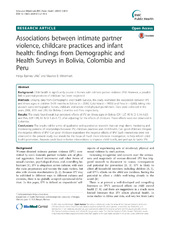Associations between intimate partner violence, childcare practices and infant health: Findings from Demographic and Health Surveys in Bolivia, Colombia and Peru
Peer reviewed, Journal article
Published version

Åpne
Permanent lenke
https://hdl.handle.net/1956/11416Utgivelsesdato
2015-08-25Metadata
Vis full innførselSamlinger
Originalversjon
https://doi.org/10.1186/s12889-015-2144-0Sammendrag
Background: Child health is significantly poorer in homes with intimate partner violence (IPV). However, a possible link to parental provision of childcare has been neglected. Methods: Utilizing data from Demographic and Health Surveys, this study examined the association between IPV and illness signs in children 0–59 months in Bolivia (n = 3586), Colombia (n = 9955) and Peru (n = 6260), taking into account socio-demographic factors, childcare and severe child physical punishment. Data were collected in the years 2008, 2010 and 2012 for Bolivia, Colombia and Peru respectively. Results: The study found weak but persistent effects of IPV on illness signs in Bolivia (OR 1.37, 95 % CI 1.14–1.63) and Peru (OR 1.49, 95 % CI 1.26–1.77), after adjusting for the effects of childcare. These effects were not observed in Colombia. Conclusions: The results call for a mix of qualitative and quantitative research that can map direct, mediating and moderating patterns of relationships between IPV, childcare practices and child health. Can good childcare mitigate the negative effects of IPV? Can poor childcare exacerbate the negative effects of IPV? Such interactions were not observed in the present study, but should be the focus of much more intensive investigation, to help inform child health promotion. Answers could lead to better interventions to improve child health, and perhaps to tackle IPV.
